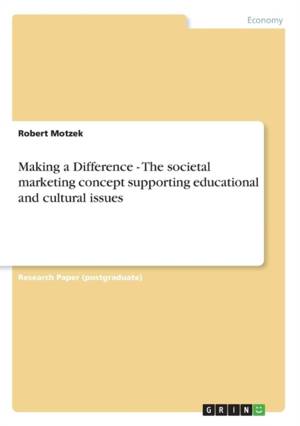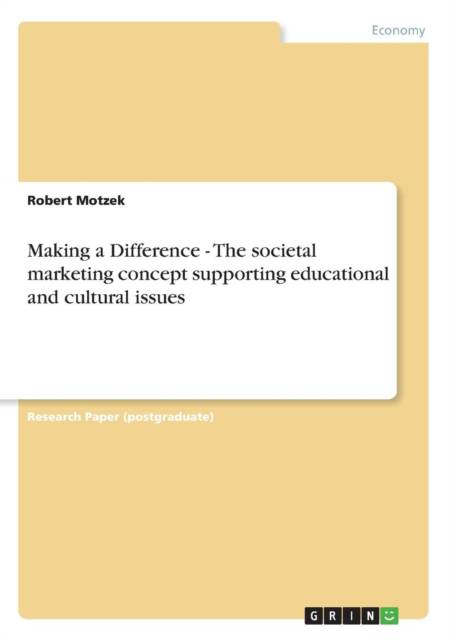
- Retrait gratuit dans votre magasin Club
- 7.000.000 titres dans notre catalogue
- Payer en toute sécurité
- Toujours un magasin près de chez vous
- Retrait gratuit dans votre magasin Club
- 7.000.0000 titres dans notre catalogue
- Payer en toute sécurité
- Toujours un magasin près de chez vous
Making a Difference - The societal marketing concept supporting educational and cultural issues
Robert Motzek
23,45 €
+ 46 points
Description
Research Paper (postgraduate) from the year 2002 in the subject Business economics - Offline Marketing and Online Marketing, grade: 1,3 (A), European University Viadrina Frankfurt (Oder) (Economics - International Business Administration), course: Marketing Seminar, language: English, abstract: In June 1995 the off-shore oil rig Brent Spar, owned by oil and petrol giants Dutch-Shell and British Esso, was supposed to be dumped in a depth of 2400 metres near the Scottish westcoast. British institutions had already permitted the dumping, which due to institutional investigations didn't violate the international environmental conventions made in Oslo and Paris to protect the sea. But suddenly the environmental organization Greenpeace launched a European-wide protest campaign to prevent the dumping of Brent Spar, which resulted in massive boycotts of Shell's petrol stations all over the continent. The enormous public support of Greenpeace's campaign forced Dutch-Shell not to dump Brent Spar but to tow it into a Norwegian fjord where it has been stored until today. By now there hasn't been a solution for the disposal of the oil rig. In the case of Brent Spar everyone mentioned responsibility. The responsibility of the Dutch-Shell company to protect the environment, to report about future actions and their consequences and to base decision-making on more than just the opinions of shareholders. According to the public opinion, Dutch-Shell hadn't taken this responsibility, the so-called social responsibility, which turned out to harm the image and sales of the company for years. This project work will explain the meaning and the role of social responsibility in marketing concerning past, present and future developments. Looking at the societal markteting concept supporting educational and cultural issues, we'll see why and in which way firms adopt the societal marketing concept and how this affects their businesses, customers, organizations, governments and the society as a
Spécifications
Parties prenantes
- Auteur(s) :
- Editeur:
Contenu
- Nombre de pages :
- 36
- Langue:
- Anglais
- Collection :
- Tome:
- n° 2157
Caractéristiques
- EAN:
- 9783656058489
- Date de parution :
- 17-11-11
- Format:
- Livre broché
- Format numérique:
- Trade paperback (VS)
- Dimensions :
- 148 mm x 210 mm
- Poids :
- 58 g

Les avis
Nous publions uniquement les avis qui respectent les conditions requises. Consultez nos conditions pour les avis.






